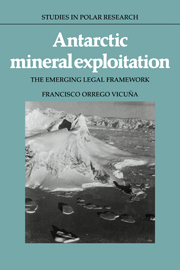Book contents
- Frontmatter
- Contents
- Preface
- Acknowledgement
- Abbreviations
- Part I The international legal framework of Antarctic co-operation and the development of resources
- Part II Alternative approaches to the conservation and development of Antarctic minerals: the process of internal accommodation
- 5 Basic elements of the regime for the exploration and exploitation of Antarctic mineral resources
- 6 Special policies pursued by the mineral resources regime
- 7 The distribution of powers within the regime: models and alternatives for accommodation
- 8 The institutional system of the mineral regime
- Part III Issues and options relating to the external accommodation
- Appendix 1 The Antarctic Treaty
- Appendix 2 Table of signatures and ratifications
- Table of Cases
- Table of Statutes and national legislation
- Table of Treaties
- Bibliography
- Index
6 - Special policies pursued by the mineral resources regime
Published online by Cambridge University Press: 04 November 2009
- Frontmatter
- Contents
- Preface
- Acknowledgement
- Abbreviations
- Part I The international legal framework of Antarctic co-operation and the development of resources
- Part II Alternative approaches to the conservation and development of Antarctic minerals: the process of internal accommodation
- 5 Basic elements of the regime for the exploration and exploitation of Antarctic mineral resources
- 6 Special policies pursued by the mineral resources regime
- 7 The distribution of powers within the regime: models and alternatives for accommodation
- 8 The institutional system of the mineral regime
- Part III Issues and options relating to the external accommodation
- Appendix 1 The Antarctic Treaty
- Appendix 2 Table of signatures and ratifications
- Table of Cases
- Table of Statutes and national legislation
- Table of Treaties
- Bibliography
- Index
Summary
Environmental conservation policy
On the basis of the provisions of the Antarctic Treaty which have a rather indirect bearing on environmental questions, the Consultative Parties have undertaken an intensive norm-creating function in this field. It has taken the form, in the first place, of the adoption of various recommendations relating to the topic of the Impact of Man on the Antarctic Environment, and recently has focussed more specifically on the problem of oil pollution. As we had the opportunity to examine in Chapter 2, the measures enacted by the Consultative Parties can have either a recommendatory or a binding nature depending on the specific contents of the instrument in question. In the environmental field the trend has been generally to introduce measures of a binding nature, particularly by means of the resources regimes; the fact, however, that many times there are no adequate institutional procedures for enforcement has determined that State practice has become the single most important controlling factor of this policy, sometimes leading to abuses or distortions, a case in point being the recent discussion about the French airstrip at Pointe Géologie.
The competence of the Consultative Parties in the environmental sphere is largely founded upon the concept of the ‘special responsibility’ of the Treaty Parties in this field. Concurrently, the steps that have been taken in respect of the separate but linked resources regimes have been closely associated with the concerns existing in relation to environmental protection.
- Type
- Chapter
- Information
- Antarctic Mineral ExploitationThe Emerging Legal Framework, pp. 279 - 313Publisher: Cambridge University PressPrint publication year: 1988



